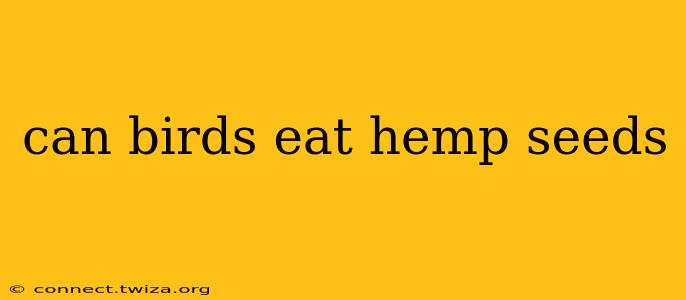Hemp seeds are increasingly popular among humans for their nutritional value, but can our feathered friends enjoy them too? The short answer is: yes, but with some important caveats. While hemp seeds offer several potential benefits for birds, providing them in moderation and understanding potential drawbacks is crucial. This guide will delve into the nutritional value, potential risks, and best practices for offering hemp seeds to your avian companions.
Are Hemp Seeds Good for Birds?
Hemp seeds boast a remarkable nutritional profile, rich in protein, healthy fats (omega-3 and omega-6 fatty acids), fiber, and various vitamins and minerals. These nutrients contribute to a bird's overall health, supporting their immune system, feather growth, and energy levels. Specifically, the omega-3 fatty acids are particularly beneficial for maintaining healthy skin and feathers, which is crucial for a bird's overall well-being.
What are the Potential Risks of Feeding Birds Hemp Seeds?
While hemp seeds are generally safe, potential risks exist if not given appropriately. Overfeeding can lead to digestive upset, as the high fat content can be difficult for some birds to process. Always introduce hemp seeds gradually to monitor your bird's reaction and avoid potential digestive issues. Furthermore, ensure the hemp seeds are unprocessed and free from pesticides or other harmful chemicals, as these can be toxic to birds.
Can All Types of Birds Eat Hemp Seeds?
Not all birds will react the same way to hemp seeds. Larger birds with more robust digestive systems may tolerate larger quantities than smaller birds. Always start with small amounts and observe your bird for any adverse reactions, such as diarrhea, vomiting, or lethargy. If you notice any negative symptoms, discontinue feeding hemp seeds immediately and consult an avian veterinarian.
How Much Hemp Seed Should I Feed My Bird?
There's no one-size-fits-all answer. The appropriate amount depends on the bird's size, species, overall diet, and activity level. A good rule of thumb is to start with a very small amount – a teaspoon or less – once or twice a week as a supplemental treat, not a staple food. Gradually increase the amount if your bird tolerates it well, always keeping it as a small portion of their overall diet.
What Are the Best Ways to Feed Hemp Seeds to Birds?
You can offer hemp seeds whole or shelled. Some birds may prefer one over the other. Sprinkling a small amount over their regular food or offering them in a separate dish are both effective methods. Avoid feeding hemp seeds in large quantities, particularly to smaller birds. Remember, variety is key to a healthy bird diet.
Are There Other Seeds Birds Can Eat?
Yes, many other seeds are safe and beneficial for birds, including sunflower seeds, pumpkin seeds, and safflower seeds. However, remember to offer these in moderation as well, maintaining a balanced diet.
Can I Give My Bird Hemp Seed Oil?
Hemp seed oil is not recommended for birds. While it does contain beneficial fatty acids, it is not formulated for avian consumption and may cause digestive problems. Stick to whole hemp seeds, keeping the quantity in check.
Where Can I Buy Safe Hemp Seeds for My Birds?
Purchase hemp seeds from reputable sources that guarantee their quality and safety. Look for products specifically marketed as bird-safe, or choose organic, pesticide-free options from reputable pet stores or online retailers. Always check the ingredient list to ensure there are no added preservatives or harmful substances.
By following these guidelines, you can safely and responsibly incorporate hemp seeds into your bird's diet, providing them with additional nutritional benefits. Remember to always prioritize the health and well-being of your feathered companion and consult with an avian veterinarian if you have any concerns.
